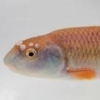Does anyone else share thier collection data? Are there groups of volunteers in your area that catalog the advancements or decline of local fish species?
I keep detailed records of my personal fish samplings, but if I told my local DNR about this they'd probably giggle at me. All right, since I know some of their fisheries guys they'd probably pay attention if I had pictures of a rare species from a location that said fish was not previously known, but honestly, the DNR office I volunteer at gets so many "flop" calls (Hello? I's found a beeg watuh mawkuhsin een my bagyard, wut shood I's do wid it? *protip: there are no water moccasins in IA*), I think that they feel like the parents in "The Boy Who Cried Wolf." I'm not sure how it is in other places (granted, the Iowa DNR focuses almost solely on game fish since it's the anglers who fund it) but if they are more interested in information and the reports are sound, then who's to shrug off free info? Science and study is expensive and laborous my friend! It's awesome to hear that the FWC wants your reports.
The second question: I sure wish! I believe an extremely low number of people here care about the water quality and species diversity in Iowa, because it's already so muddied (half of the former 12" of topsoil are now gone) and nutrient saturated (Des Moines is home to the largest nitrate removal plant in the U.S.) that it seems like a pointless battle.

Most of the time you need to travel to the extreme northeast to see any streams or waterbodies that approach snorkelable. It also pains me to see otherwise well-managed wildlife preserve areas that have carefully monitered and restored native terrestrial species turn a blind eye towards the potentially productive watershed they lie upon. Bluegill/Bass/Crappie/Channel Cat is
not diverse.
To end on a lighter note, it would be great to start an organization encouraging study, but wouldn't it be wise to check around for ones that already exist? I know I've heard of such groups existing in many of the southern states. Plus... isn't that what NANFA is really about?









